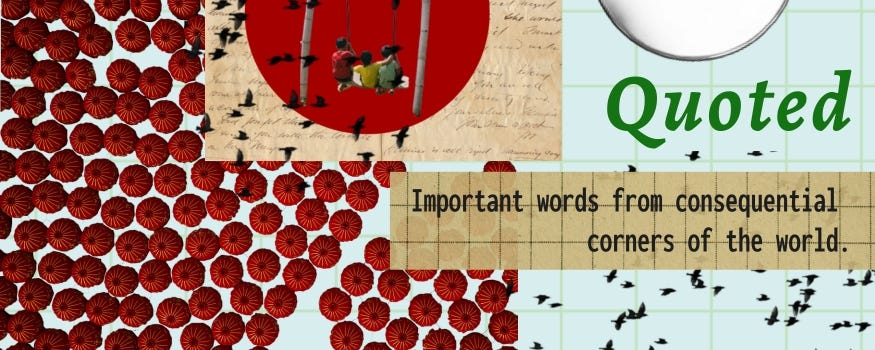Inside the Shutdown of Yale’s War Crimes Research Lab
Plus: Ana Wintour's exeunt, an Afrofuturist video game, and more.
Welcome back to another edition of The Detour. Every couple of weeks, I explore the context and consequences behind U.S. and global affairs.
Here’s what’s on deck:
🔬 A lab tracking war crimes and child abductions in Ukraine has lost U.S. funding, despite bipartisan support and crucial ICC evidence
🕶️ A generational shift in the ivory tower of fashion
🎮 How an Afrofuturist game is reviving — and reclaiming — stolen African artifacts
The Detour is published in partnership with Frame Media, a creative software tool that evolved out of a multimedia journalism publication. Frame allows anyone to create visual, engaging stories that can be hosted online or published to social media. If you’re interested in trying Frame, join the waitlist here.
35,000 — the staggering number of Ukrainian children still missing amid Russia’s ongoing invasion of Ukraine, likely held at over 100 sites in Russia or occupied territories, according to Yale’s Humanitarian Research Lab (HRL).
HRL has quietly powered the U.S. State Department’s Conflict Observatory since before the 2022 invasion, providing satellite and open-source investigations into systemic abductions. Their work has located thousands of missing minors, guided prosecutors and NGOs, supported Europol and Ukrainian law enforcement, and even helped spur ICC warrants against Putin and Lvova‑Belova, alongside a U.S. determination of crimes against humanity.
But all of this could end on Tuesday: In February, U.S. Congress defunded the Conflict Observatory and ordered the transfer of HRL’s data to Ukrainian partners and Europol. With funding gone, the lab will shut down on July 1. I spoke with HRL’s executive director, Nathaniel Raymond, precisely when the final datasets were handed off:
Raymond: By the summer of 2022, we had major successes with the State Department in documenting attacks on hospitals and schools and identifying the filtration camps outside Mariupol, after Mariupol fell and — and so we then... I'm just receiving the official confirmation that Europol has all the data. Me: Oh wow — Raymond: So I just got it right now — 10:19 [a.m.] Me: Wow. Raymond: Yeah, so the Europol transfer is complete — and thus we're officially dead with the U.S. government.Further down, I look into HRL’s greatest contributions to our understanding of the war in Ukraine, and what we stand to lose in its absence.
37 years — The amount of time fashion icon Ana Wintour has been editor-in-chief of the Condé Nast-owned magazine, Vogue. On Thursday in a staff meeting, the fashion maven announced she will step down from her Miranda Priestly-esque role. But don’t worry; she won’t be away for good: Wintour will remain chief content officer for Condé Nast and global editorial director of the magazine.
“I find that my greatest pleasure is helping the next generation of impassioned editors storm the field with their own ideas, supported by a new, exciting view of what a major media company can be. And that is exactly the kind of person we need to now look for to be HOEC [Head of Editorial Content] for U.S. Vogue.”
— Ana Wintour during a Thursday meeting with Vogue staff
2 years — the amount of time it took video game developers to research the real-life African artifacts featured in the soon-to-be-released game, “Relooted,” inspired by a visit to the British Museum. Set in an Afrofuturist society, the game centers on a team of friends reclaiming African cultural items, painstakingly recreated from scarce references. In a write-up by Epic Games, Creative Director Ben Myres described the use of a real drum from Kenya in the gameplay. In real life, the people of Kenya thought it was destroyed years ago. “It turns out that it’s been in the British Museum storage for the last 100 years. The first Kenyan people to see it in the last 100 years were in the 2010s. It was taken in 1870.”
“We want to give people information about how important these artifacts were to the people they were taken from,” he told Epic Games.
948+ — The number of anti-LGBT bills filed so far in 2025, marking a historic record just as Pride Month — a month intended for LGBT celebration and recognition — comes to a close. These laws include bans on gender-affirming care, sports participation, bathroom access, and legal recognition of LGBTQ+ identities, as well as forced outing by schools, pronoun restrictions, “Don’t Say Gay” policies, and book bans. A report by Human Rights Watch explained that what may appear as isolated attacks in state legislatures are actually part of a coordinated national strategy that uses states as testing grounds for a right-wing agenda aimed at restricting LGBTQ+ freedoms, with the ultimate goal of pushing these policies to the federal level.
"The Russians made a major mistake when they started the Sister Cities Program. Individual cities and towns inside Russia at the mayoral level were sponsoring [stolen Ukrainian] children to go to re-education camps. ... The mayor started taking selfies with the kids, and they left their location settings on their phone.”
— Nathaniel Raymond, Executive Director of HRL, on the detail that broke open an investigation into war crimes committed by Russia.
The Humanitarian Research Lab (HRL), a small but essential unit at Yale University which helped uncover war crimes in Ukraine and Sudan, and was instrumental in building six war crimes cases against Russian President Vladimir Putin, may be forced to shut down on Tuesday.
Over the last few years, the lab has played a critical role in exposing the Russian government’s forced deportation of Ukrainian children — work that led to an arrest warrant for Vladimir Putin by the International Criminal Court.
“There was an additional $8 million for us,” Raymond told me. “Appropriated by Congress through the fifth Ukraine supplemental and notified by the State Department to Congress that it was to be spent on an extension of our work focusing on kids. And that money that would keep us alive is being simply held back by the Trump administration.”

Raymond points to what he sees as a larger trend. The Washington Post recently reported that Trump officials are “holding back or terminating” funding for initiatives tied to accountability for Russia and Putin. That includes efforts with clear bipartisan support, like this one. Despite two letters from both sides of the aisle in Congress asking about the holdup, no answer has come.
Without that $8 million, the lab’s Ukraine operations will end within a week. For now, they’re scraping by on donations. They expect to make it to Labor Day, but no further.
The Yale team’s methods were precise and uniquely effective. They fused satellite data with open-source intelligence to predict attacks, identify hidden detention camps, and map the movement of children. They traced war crimes to specific Russian mayors — one of whom had posted a selfie from a city receiving abducted children, leaving location data turned on.

In one case, Raymond said, they discovered that children were being deliberately buried in databases to conceal their identities. “We were able to see that kids were being hidden , and to access that data without compromising the safety of the data,” he said.
Their work was so singular and valuable, the U.S. government found it irreplicable: Two weeks before Russia’s invasion of Ukraine, in February 2022, the State Department asked the team to get ready, “to see if we could pre-position ourselves to catch evidence of crimes before they had occurred,” Raymond explained to me.
Now, the story of how war crimes are uncovered is turning into a story about whether the team best equipped to expose them will be allowed to survive.
That’s all for now, folks. Catch you next week.









